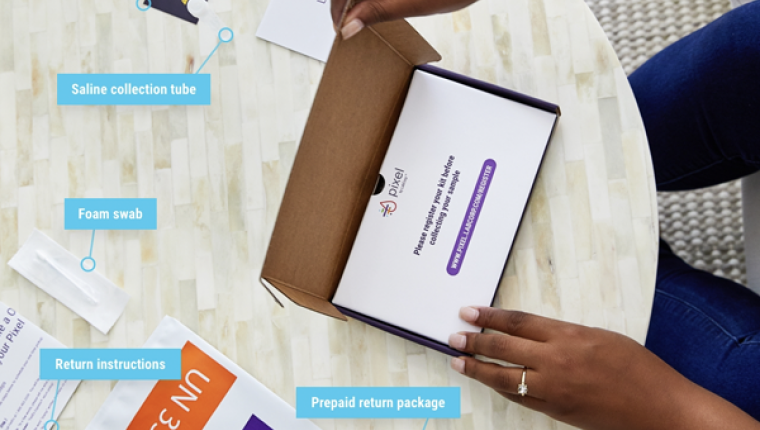
Testing is self-care: Keeping Safe from COVID, Colds, the Flu and RSV this Autumn
Back to school. Holiday gatherings. And staying inside to keep warm! The fall brings cooler temperatures but also more exposure to contagious diseases and seasonal allergies.
Colds, allergies, the flu and respiratory syncytial virus (RSV) are an inevitable part of autumn and winter. However, the sniffles don’t always mean COVID-19. There are tests for just about any of the typical sniffle-causing ailments you may encounter during the colder parts of the year.
What’s the difference between COVID-19, the flu, RSV and allergies?
COVID-19, the flu and RSV are all viruses that can infect the lungs, airways, sinuses or throat. Because people tend to spend more time inside during the fall and winter, exposure to these viruses increases. It is possible for someone to be infected by multiple viruses like these at one time.
The main differences between these three are the viruses that cause them:
- COVID-19 is caused by an infection of the SARS-CoV2 virus
- The flu is caused by the influenza virus
- RSV is caused by the respiratory syncytial virus
All are contagious, but the flu and COVID-19 can vary from year-to-year or variant-to-variant in how contagious they are. RSV, on the other hand, is highly contagious and extremely dangerous to infants and the elderly.
One symptom that seems to be unique to COVID-19 is the loss of taste and/or smell. Furthermore, the flu and COVID-19 share other symptoms—such as vomiting and diarrhea—that RSV doesn’t.
Allergies affect more than 50 million people in the US each year1 and are the sixth leading cause of chronic illness. There are plenty of seasonal allergy symptoms that mirror those of COVID-19, the flu and RSV. However, some unique to allergies stand out, such as:
- Watery eyes
- Rashes
- Hives
- Swelling of lips, tongue and/or throat
We provide a wide range of tests that can identify 500+ relevant allergens—including grasses, foods, molds and animal dander—to help you get the allergy answers you need this fall.
Why testing is important
Ultimately, testing is one of the greatest tools we have in the fight against infectious diseases like COVID-19. Knowing your status helps you make decisions about being around other people, such as sending your children to school every day and holiday gatherings with the family.
Testing for SARS-Cov2—the virus that causes COVID-19—is a vitally important way to ensure the health and safety of you, your loved ones and everyone else. Before joining larger crowds, it’s extremely important to test if you or your family:
- Are experiencing symptoms of COVID-19
- Have been in close contact with someone who tested positive for COVID-19 (even if vaccinated)
- Are not vaccinated and have participated in a high-risk activity like traveling or large gatherings
- Have been asked by a healthcare provider to get tested
However, COVID-19, a cold, the flu and respiratory syncytial virus (RSV) aren’t the only culprits for feeling sick in the fall. Fall allergy symptoms—stuffy nose, post-nasal drip, fatigue, etc.—can be very similar to any of the above. Just like previous autumns and winters during COVID-19, it’s helpful to familiarize yourself with testing options as new routines begin. There are convenient tests available that you can order on your own:
These can help determine the right course of action when navigating health safety during the colder months. It’s also important to remember that your healthcare provider is there for you to help with testing you and your family.
With COVID-19, why should I confirm a rapid antigen test with a PCR test? Recently, the even more contagious Omicron variant of COVID-19 showed us that regular testing is one of the smartest and safest measures to avoid infection (or infecting others) after receiving the vaccines. There are two main kinds of tests—rapid antigen and polymerase chain reaction (PCR) tests.
Rapid antigen tests are great for a fast answer: the procedure is very simple, and you receive results in no more than 20 minutes. But, rapid antigen tests have a greater chance of a false negative or false positive result. It’s a good idea to confirm results from rapid antigen tests with a more reliable test.
That’s where PCR (polymerase chain reaction) tests come in. PCR tests are the gold standard for a more accurate answer and can be done in a timely manner as well. These tests employ a procedure that amplifies the genetic material of the sample, so any trace amount of the virus can be detected. The process literally converts the RNA in the sample to DNA and replicates it through a heating/cooling process until a billion copies of the sample are created. It’s then easier to detect a trace of the virus if it exists in the sample. This way, PCR tests provide a level of heightened accuracy, giving you more confidence in your result.
At Labcorp, our COVID-19 PCR tests are “variant agnostic,” meaning they can detect the presence of the virus, no matter the variant (alpha, delta, omicron, et al.). Because of their heightened sensitivity in detecting variants, PCR tests are the best option for confirming initial results of a rapid antigen test.
As the days get shorter and colder, help keep you, your children and others safer from COVID-19, flu, and RSV statuses with testing when recommended. With fall seasonal allergies in full swing (like frustrating ragweed), it’s even more important to know what your symptoms mean.
That’s what we’re here to help provide: answers to your health questions this Fall that you and your family can trust. To get things started, you have multiple options when it comes to getting you and your family tested:
Get a COVID-19/RSV/Flu combo test kit online from Labcorp OnDemand.
Or, get a drive-thru PCR test at a CVS or a Walgreens near you.




